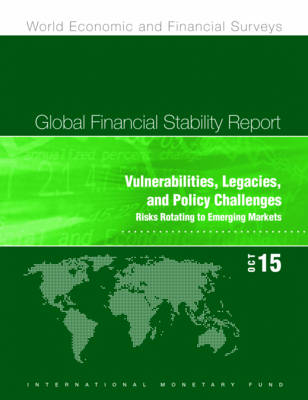
Global financial stability report
vulnerabilities, legacies, and policy challenges, risks rotating to emerging markets
Seiten
2015
International Monetary Fund (IMF) (Verlag)
978-1-5135-8204-7 (ISBN)
International Monetary Fund (IMF) (Verlag)
978-1-5135-8204-7 (ISBN)
The GFSR aims to deepen understanding of global capital flows, which play a critical role as an engine of world economic growth. It focuses on current conditions in global financial markets, highlighting issues of financial imbalances, and of a structural nature, that could pose risks to financial market stability and sustained market access by emerging market borrowers.
The October 2015 Global Financial Stability Report finds that, despite an improvement in financial stability in advanced economies, risks continue to rotate toward emerging markets. The global financial outlook is clouded by a triad of policy challenges: emerging market vulnerabilities, legacy issues from the crisis in advanced economies, and weak systemic market liquidity. With more vulnerable balance sheets in emerging market companies and banks, firms in these countries are more susceptible to financial stress, economic downturn, and capital outflows. Recent market developments such as slumping commodity prices, China's bursting equity bubble, and pressure on exchange rates underscore these challenges. The prospect of the U.S. Federal Reserve gradually raising interest rates points to an unprecedented adjustment in the global financial system as financial conditions and risk premiums normalize from historically low levels alongside rising policy rates and a modest cyclical recovery. The report also examines the factors that influence levels of liquidity in securities markets, as well as the implications of low liquidity. Currently, market liquidity is being supported by benign cyclical conditions. Although it is too early to assess the impact of recent regulatory changes on market liquidity, changes in market structure, such as larger holdings of corporate bonds by mutual funds, appear to have increased the fragility of liquidity. Finally, the report studies the growing level of corporate debt in emerging markets, which quadrupled between 2004 and 2014. The report finds that global drivers have played an increasing role in leverage growth, issuance, and spreads. Moreover, higher leverage has been associated with, on average, rising foreign currency exposures. It also finds that despite weaker balance sheets, firms have managed to issue bonds at better terms as a result of favorable financial conditions.
The October 2015 Global Financial Stability Report finds that, despite an improvement in financial stability in advanced economies, risks continue to rotate toward emerging markets. The global financial outlook is clouded by a triad of policy challenges: emerging market vulnerabilities, legacy issues from the crisis in advanced economies, and weak systemic market liquidity. With more vulnerable balance sheets in emerging market companies and banks, firms in these countries are more susceptible to financial stress, economic downturn, and capital outflows. Recent market developments such as slumping commodity prices, China's bursting equity bubble, and pressure on exchange rates underscore these challenges. The prospect of the U.S. Federal Reserve gradually raising interest rates points to an unprecedented adjustment in the global financial system as financial conditions and risk premiums normalize from historically low levels alongside rising policy rates and a modest cyclical recovery. The report also examines the factors that influence levels of liquidity in securities markets, as well as the implications of low liquidity. Currently, market liquidity is being supported by benign cyclical conditions. Although it is too early to assess the impact of recent regulatory changes on market liquidity, changes in market structure, such as larger holdings of corporate bonds by mutual funds, appear to have increased the fragility of liquidity. Finally, the report studies the growing level of corporate debt in emerging markets, which quadrupled between 2004 and 2014. The report finds that global drivers have played an increasing role in leverage growth, issuance, and spreads. Moreover, higher leverage has been associated with, on average, rising foreign currency exposures. It also finds that despite weaker balance sheets, firms have managed to issue bonds at better terms as a result of favorable financial conditions.
| Erscheinungsdatum | 09.01.2016 |
|---|---|
| Reihe/Serie | World economic and financial surveys |
| Zusatzinfo | col. figs, tables |
| Verlagsort | Washington, DC |
| Sprache | englisch |
| Themenwelt | Wirtschaft ► Betriebswirtschaft / Management ► Finanzierung |
| Wirtschaft ► Volkswirtschaftslehre ► Finanzwissenschaft | |
| ISBN-10 | 1-5135-8204-6 / 1513582046 |
| ISBN-13 | 978-1-5135-8204-7 / 9781513582047 |
| Zustand | Neuware |
| Haben Sie eine Frage zum Produkt? |
Mehr entdecken
aus dem Bereich
aus dem Bereich
Allgemeines Steuerrecht, Abgabenordnung, Umsatzsteuer
Buch (2024)
Springer Gabler (Verlag)
28,00 €
Grundlagen, Beispiele, Übungsaufgaben mit Musterlösungen
Buch | Softcover (2024)
Vahlen (Verlag)
24,90 €


